

The Syrian Regime's Business Backbone. Nearly one year into the Syrian uprising, with more than 7,500 Syrians dead, the protracted conflict is not very well understood or reported despite a deluge of writings.
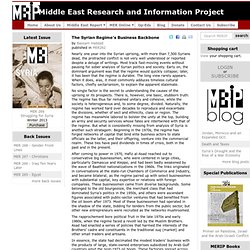
Most track fast-moving events without pausing for sober analysis of Syrian politics and society. How Assad Stayed In Power—And How He'll Try to Keep It. On November 12, the Arab League suspended Bashar al-Assad's Syria.
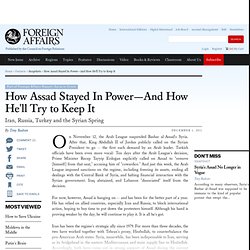
After that, King Abdullah II of Jordan publicly called on the Syrian President to go -- the first such demand by an Arab leader. Turkish officials have been even more vocal: Ten days after the Arab League's decision, Prime Minister Recep Tayyip Erdoğan explicitly called on Assad to "remove [himself] from that seat," accusing him of "cowardice. " And just this week, the Arab League imposed sanctions on the regime, including freezing its assets, ending all dealings with the Central Bank of Syria, and halting financial interaction with the Syrian government. Iraq abstained, and Lebanon "dissociated" itself from the decision. For now, however, Assad is hanging on -- and has been for the better part of a year.
Iran has been the regime's strategic ally since 1979. To continue reading, please log in. Don't have an account? Register Register now to get three articles each month. Register for free to continue reading. Analysis: Syria's Assad loses his grip to hardliners. A New Phase? Syria Roundup. [This post, originally started earlier this week, will be updated as matters develop after today's bombing.
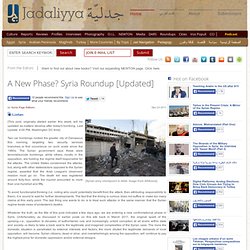
Last Update: 4:00 PM, Washington DC time] Two car bombings rocked the greater city of Damascus this morning, targeting two security services branches--a first occurrence on such scale since the 1980s. The Syrian government says these were terrorist/suicide bombings, while others, mostly in the opposition, are holding the regime itself responsible for the attacks. The United States condemned the attacks, but, along with other states/actors opposed to the Syrian regime, asserted that the Arab League's observers' mission must go on. The death toll was registered around forty-four, while the injured amounted to more than one-hundred and fifty. To avoid functionalist thinking (i.e. noting who could potentially benefit from the attack, then attributing responsibility to them), it is sound to wait for further developments.
Speechless in Bashar Assad’s Syria. To capture the essence of the Syrian regime’s behavior today, a very useful place to start is W.
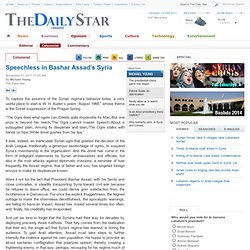
H. Auden’s poem “August 1968,” whose theme is the Soviet suppression of the Prague Spring. “The Ogre does what ogres can,/Deeds quite impossible for Man,/But one prize is beyond his reach,/The Ogre cannot master Speech:/About a subjugated plain, Among its desperate and slain,/The Ogre stalks with hands on hips,/While drivel gushes from his lips.” It was, indeed, an inarticulate Syrian ogre that greeted the decision of the Arab League, traditionally a generous assemblage of ogres, to suspend Syria’s membership in the organization. Syria's Assad No Longer in Vogue. It was slow in coming, but the Arab revolutionary wave of 2011 has reached Syria.
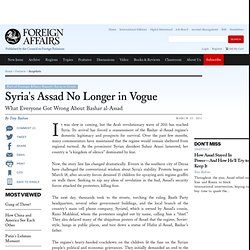
The Syrian Time Bomb - By Patrick Seale. While one war rages in Libya, another rages in Washington as to the necessity of U.S. action there.

Indeed, Defense Secretary Robert Gates said as much this weekend, noting that Libya was not a "vital national interest. " But if Washington is looking for an Arab state in the throes of unrest, one that is key to its regional and national interests, planners might want to pay more attention to Syria, which is currently undergoing upheaval not seen since the early 1980s. Syria lies at the center of a dense network of Middle East relationships, and the crisis in that country -- which has now resulted in the deaths of well over 100 civilians, and possibly close to double that number -- is likely to have a major impact on the regional structure of power.
إدانة إسلامية.. وتركيا: على الأسد الاختيار بين مصير بن علي والقذافي, الأولـــــى. إدانة إسلامية..
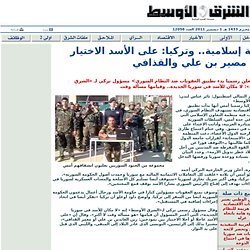
وتركيا: على الأسد الاختيار بين مصير بن علي والقذافي أوغلو يعلن رسميا بدء تطبيق العقوبات ضد النظام السوري> مسؤول تركي لـ «الشرق الأوسط»: لا مكان للأسد في سوريا الجديدة.. وقيامها مسألة وقت جدة: فايز الثمالي اسطنبول: ثائر عباس لندن: «الشرق الأوسط» أعلنت تركيا رسميا أمس أنها بدأت تطبيق عقوبات اقتصادية تستهدف النظام السوري، في وقت دعت فيه منظمة التعاون الإسلامي التي انعقدت في جدة أمس، السلطات السورية لقبول المبادرة العربية، وأدانت الاعتداء على السفارات في دمشق. وفي ختام اجتماع طارئ لوزراء خارجية الدول الأعضاء، دعت المنظمة سوريا إلى «الاستجابة» لقرارات جامعة الدول العربية، كما طالبتها بـ«التوقف فورا عن استخدام القوة المفرطة ضد المدنيين من أجل تجنب البلاد خطر تدويل الأزمة». وفي أنقرة، أعلن وزير الخارجية التركي أحمد داود أوغلو أمس أن بلاده «علقت كل التعاملات الائتمانية المالية مع سوريا وجمدت أصول الحكومة السورية».
وسوف تمنع العقوبات مسؤولين كبارا في حكومة الأسد ورجال أعمال يدعمون الحكومة السورية أيضا من السفر إلى تركيا. The Syrian Uprising of 2011: Why the Asad Regime Is Likely to Survive to 2013. Spring 2012, Volume XIX, Number 1 Will President Bashar al-Asad make it to 2013?
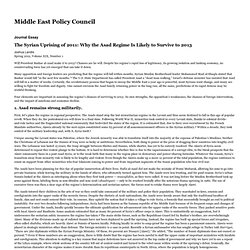
Chances are he will. Despite his regime's rapid loss of legitimacy, its growing isolation and tanking economy, no countervailing force has yet emerged that can take it down. Syria’s crisis: The long road to Damascus. Beyond the Fall of the Syrian Regime. Syrians are approaching the one-year anniversary of what has become the most tragic, far-reaching and uncertain episode of the Arab uprisings.
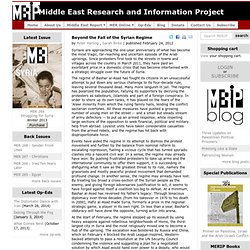
Since protesters first took to the streets in towns and villages across the country in March 2011, they have paid an exorbitant price in a domestic crisis that has become intertwined with a strategic struggle over the future of Syria. The regime of Bashar al-Asad has fought its citizens in an unsuccessful attempt to put down any serious challenge to its four-decade rule, leaving several thousand dead. Many more languish in jail.
Whither Syria? Historian Gelvin Looks at Arab Uprisings. Q&A: Nir Rosen's predictions for Syria - Features. Journalist Nir Rosen recently spent two months in Syria.

As well as meeting members of various communities across the country - supporters of the country's rulers and of the opposition alike - he spent time with armed resistance groups in Homs, Idlib, Deraa, and Damascus suburbs. He also travelled extensively around the country last year, documenting his experiences for Al Jazeera.
This is the final of a series of interviews he gave to Al Jazeera upon his return. Layla Al-Zubaidi · Diary: In Syria · LRB 24 May 2012. ‘Welcome to Assad’s Syria,’ the signpost at the Lebanese-Syrian border still says, letting the visitor know who owns the country. The ceasefire had just been announced, but few Syrians I knew held out much hope that three hundred UN observers could keep an eye on the whole army. The journey from Beirut to Damascus by shared taxi takes less than three hours. For years I’ve come this way to visit the Syrian side of my family. It was clear that things had changed.
Political talk among the passengers used to be limited to hushed complaints about the border police. Once across the border, you used to hold your tongue, especially around people you didn’t know – ‘dictatorship mode’. ‘How could anyone be stupid enough to think he’d just leave like Ben-Ali or Mubarak?’ The End Game in Syria - By Steven Heydemann. Even as the Assad regime pursues Syria's descent into a sectarian wasteland, its cruelty cannot obscure a discernible shift in the violent stalemate between the regime and the revolution that has endured for the past year. In recent months, the erosion of the Assad regime has acquired new momentum. The regime may have retaken the ruins of Douma, yet its military is unraveling both from below and, increasingly, from above.
The defection of Brigadier General Manaf Tlass, once a close friend of President Bashar al-Assad, has exposed deepening rifts among the regime's inner circles.